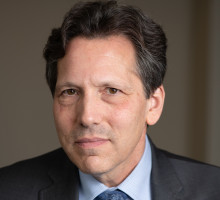Max Stearns, Venable, Baetjer & Howard Professor of Law at the University of Maryland Francis King Carey School of Law, is an interdisciplinary scholar. He applies the methodologies of economics, broadly defined, to study private and public law, along with institutional decision-making processes. His work combines neoclassical economics, interest group theory, social choice, and game theory, among other tools, to study legal doctrines and lawmaking systems. Stearns’s writings focus on constitutional decision making, the Supreme Court, and the ongoing threats facing our democracy. He has written extensively on standing, the commerce clause, separation of powers, federalism, and equal protection.
Professor Stearns’s most recent book, Parliamentary America: The Least Radical Means of Radically Repairing Our Broken Democracy (JHU Press 2024), tackles one of the most pressing issues of our time. Our democracy is in crisis. Scholars and media commentators recognize it and offer a variety of prescriptions for reform. Professor Stearns explains why nearly all widely discussed proposals will not resolve the crisis, cannot be adopted, or both. Professor Stearns explains the need for radical reform affecting our electoral system and system of executive accountability, and he offers specific proposals to bring such changes to fruition. Parliamentary America is firmly grounded in history and theory and is interspersed with familiar cultural references and childhood games. Written for a general audience, citizens concerned about the future of our democracy, the book also offers rich insights to both experts and students focused on constitutional reform. (Links to his many podcasts, radio interviews, and related writings appear on his CV).
An earlier book, Law and Economics: Private and Public (West Academic 2018) (with Todd Zywicki and Tom Miceli), comprehensively applies a broad range of economic methodologies to subject matters across the law school curriculum. The book surveys first-year courses along with many upper-level subjects, and it embraces both private and public legal domains.
Professor Stearns is also author of Constitutional Process: A Social Choice Analysis of Supreme Court Decision Making (University of Michigan Press 2001), which provides a systematic analysis of how collective decision-making processes shape doctrines and case outcomes in the Supreme Court.
Professor Stearns’s scholarly articles appear in leading academic journals: Yale Law Journal, University of Pennsylvania Law Review, California Law Review, Stanford Law Review, Georgetown Law Journal, Notre Dame Law Review, Vanderbilt Law Review, and The University of Pennsylvania Journal of Constitutional Law.
At the start of the COVID pandemic, Professor Stearns created, and he continues to run, the Maryland Carey Law Virtual Constitutional Law & Economics Workshop, bringing together leading interdisciplinary scholars from across the United States and abroad. In February 2024, he took this workshop live for the first time, assembling a wonderful group of thoughtful scholars, at Maryland Carey Law. (If you would like to join as part of this academic community, please contact Professor Stearns.)
Stearns blogs at www.blindspotblog.us on law, politics, and culture.
Professor Stearns joined the faculty at Maryland Carey Law in fall 2006 after one year as a distinguished visiting professor. He was professor of law at the George Mason University School of Law from 1992 through 2005. Professor Stearns practiced law as a litigation associate with Palmer & Dodge in Boston and with Pepper, Hamilton & Scheetz in Philadelphia. He earned his BA, summa cum laude, from the University of Pennsylvania and his JD from the University of Virginia, where he was a member of the Virginia Law Review and the Order of the Coif. Professor Stearns clerked for the Honorable Harrison L. Winter, chief judge of the U.S. Court of Appeals for the Fourth Circuit. He has taught courses in law and economics, public choice, and constitutional law at the University of Aberdeen, Aberdeen, Scotland; the Buchmann Faculty of Law, Tel Aviv University, Tel Aviv, Israel; Griffith University, Brisbane, Australia; and Canterbury University Department of Economics and Finance, Christchurch, New Zealand (as visiting Erskine Fellow). He has been a visiting professor at the University of Florida, Fredric G. Levin College of Law, and at the University of Michigan Law School.
Professor Stearns served as associate dean for research and faculty development from 2013 to 2017. Professor Stearns teaches Constitutional Law I and II (Governance and Individual Rights) and Law and Economics.

